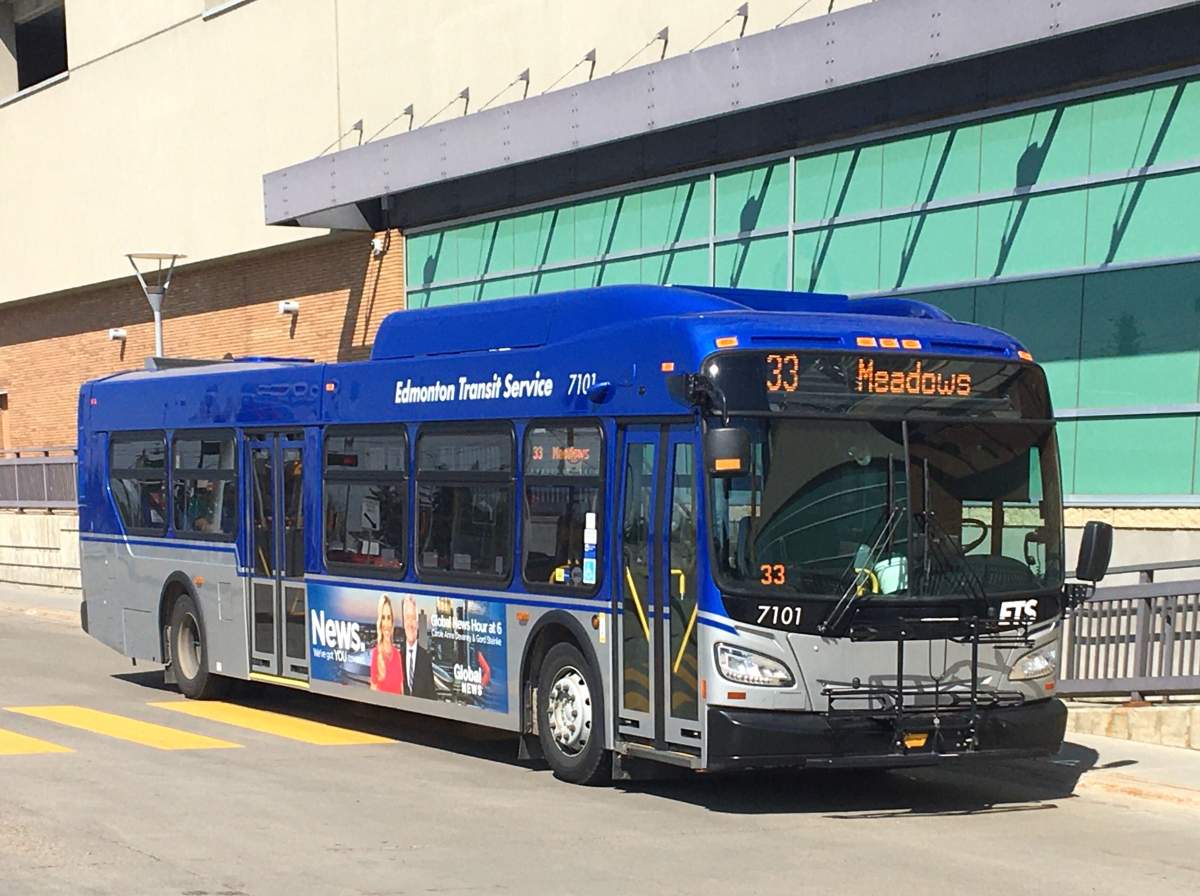Edmonton Transit is set to resume regular service by the end of next month.

ETS will be returning to regular bus service on Aug. 30. This means the City of Edmonton will recall operators who were issued temporary layoff notice earlier this year when service was reduced amid the COVID-19 pandemic.
“Super excited to get our operators back to work,” Eddie Robar, ETS branch manager, said Tuesday.
Robar said the approximately 450 operators who were issued layoff notice will receive their recall notice on July 31.
LRT service will also be extended back to regular service, which will end at 1:30 a.m. However, LRT service will operate on reduced frequencies throughout the day as a result of ongoing construction at the Stadium LRT Station.
ETS service was reduced in mid-March and fares were suspended for riders. At that time, interim city manager Adam Laughlin said ridership had dropped by about 22 per cent.
By April, transit ridership had dropped by about 75 percent compared to April 2019.
Ridership began to pick up again after Phase 1 of the province’s relaunch began in mid-May. On June 15, ETS resumed collecting transit fares.
Since then, more people have returned to using the service as more businesses have reopened and people have headed back to work. The full resumption of service will come in time for students to head back to school in person in the fall.
“While reducing service was necessary to respond to the pressures of the pandemic, customer feedback since then has indicated a need for more service and better hours for those who solely rely and depend heavily on transit,” Robar said.

Get weekly health news
Robar said Tuesday that ridership currently sits at around 50 per cent of normal capacity. This is compared to what ridership looked like at this time last year, he explained.
As more people head back to the service, masks will be mandatory on all public transit buses and trains effective Aug. 1. Masks or face coverings must also be worn at all transit stations and on LRT platforms.
All buses in the ETS fleet are equipped with a shield to separate the driver from passengers, so the city said operators will not be required to wear a mask while behind the shield.
Robar said regular cleaning of all buses will also continue.
“The protection and the safety that we’re providing for our employees will still be maintained, as well as the cleaning of the fleet,” Robar said.
“Our plan on resumption doesn’t impact our ability to clean our buses, clean our facilities. Safety is paramount to us and the of the utmost importance. So ensuring that we have the safety system in Canada is kind of where we’re looking to be.”
There are some exceptions to Edmonton’s mask mandate, including those under the age of two, people with underlying medical issues and people who are unable to put on and remove a mask without assistance.
With that in mind, Robar said the city will focus on education first.
“Not everyone is able to wear face masks, but we’re looking for all of our folks and passengers on our service to do their part and really wear face masks when they’re using transit where they are able,” he said.
When it comes to enforcement, details are still being worked out but Robar said peace officers will be in charge of enforcement, not transit operators.
“For us it’s really looking at not putting our operators in safety-sensitive situations. We do the same thing on how we handle our faring strategy,” he said.
“We are working through some of that policy directive right now and how we can be responsive to that through the coming days.
“There’s still some work to be done in terms of how we’re going to staff that in the beginning, in the first few weeks, but certainly our approach is education first and enforcement later.”
ETS Route 747 to and from the airport will resume effective Aug. 1.
The city also said U-passes will not be issued this fall due to the majority of classes being offered online. The joint decision was made by the city and participating post-secondary institutions.
Earlier Tuesday, Premier Jason Kenney announced a funding boost for municipalities. A large portion of the money was earmarked for Edmonton and Calgary’s transit systems.
Robar said the city is still in the process of diving into exactly how much funding the city will receive and what it will mean for the service.
“We’ve got some good indications of it offsetting some of our costs… Our deficit position to end of year is projected to be $60 million for just Edmonton. So there are still challenges that the city needs to work out,” he said.
“But we are absolutely elated at the fact that the provincial and federal governments are stepping up to help out municipalities with operating expenses.”
Robar said a transit fare increase was planned for this year, but that will still need to be discussed during operating budget discussions in the fall.











Comments
Want to discuss? Please read our Commenting Policy first.